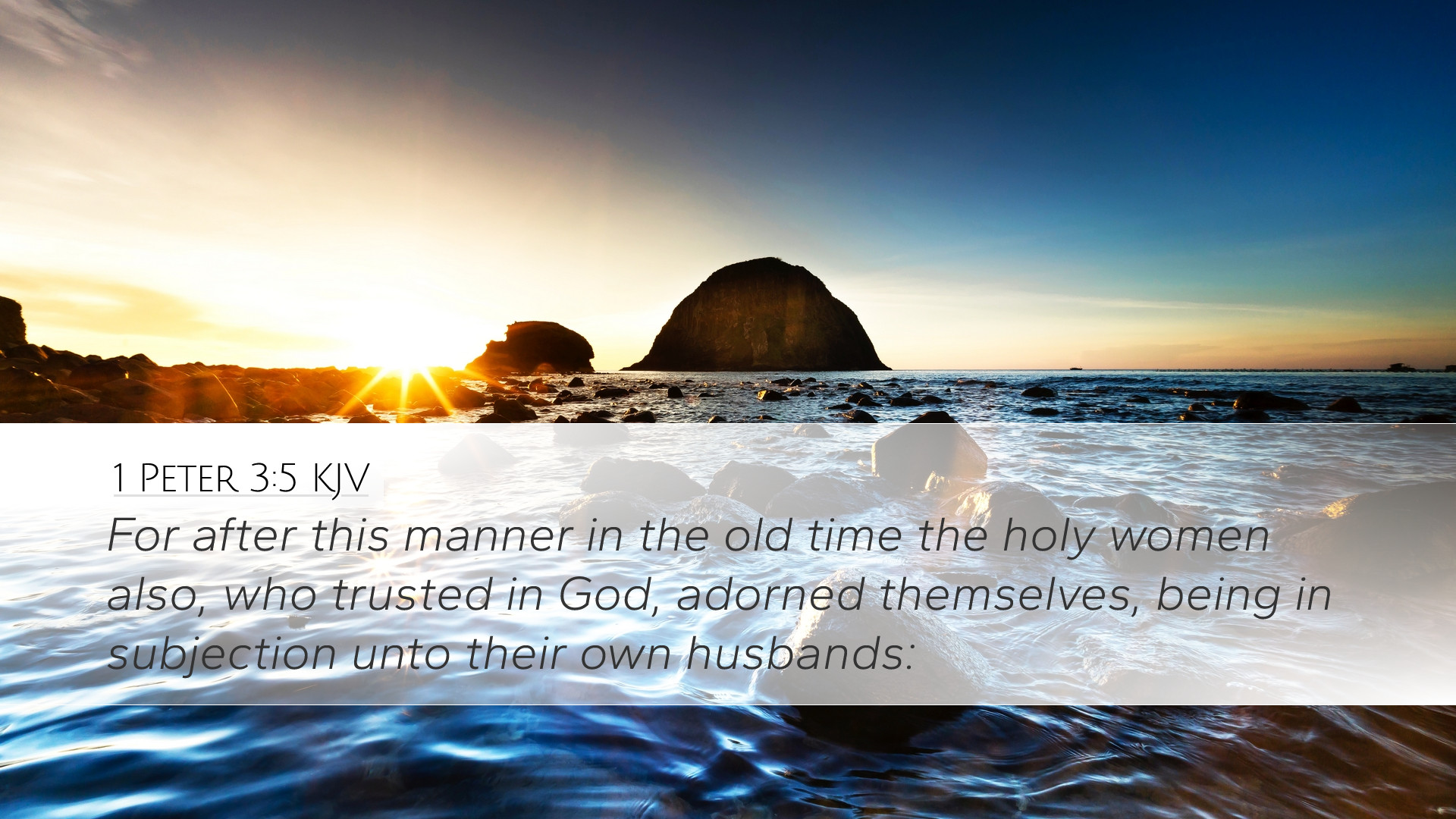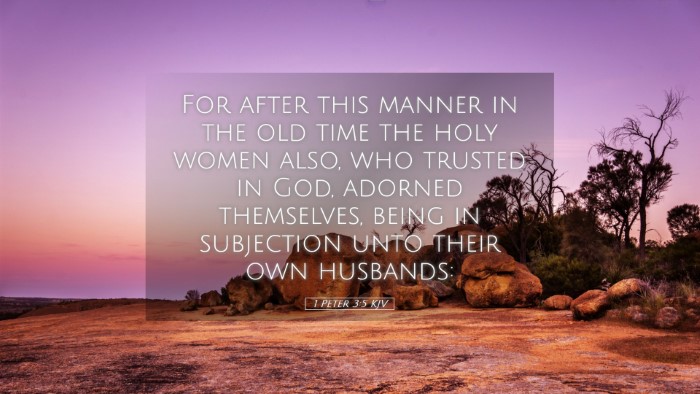Old Testament
Genesis Exodus Leviticus Numbers Deuteronomy Joshua Judges Ruth 1 Samuel 2 Samuel 1 Kings 2 Kings 1 Chronicles 2 Chronicles Ezra Nehemiah Esther Job Psalms Proverbs Ecclesiastes Song of Solomon Isaiah Jeremiah Lamentations Ezekiel Daniel Hosea Joel Amos Obadiah Jonah Micah Nahum Habakkuk Zephaniah Haggai Zechariah Malachi1 Peter 3:5
1 Peter 3:5 KJV
For after this manner in the old time the holy women also, who trusted in God, adorned themselves, being in subjection unto their own husbands:
1 Peter 3:5 Bible Commentary
Commentary on 1 Peter 3:5
1 Peter 3:5 (KJV): "For after this manner in the old time the holy women also, who trusted in God, adorned themselves, being in subjection unto their own husbands."
Introduction
This verse underscores the virtue of submission and trust in God, particularly in the context of marital relationships. It highlights the behavior of holy women from biblical times as exemplary models for contemporary believers, connecting faith, conduct, and the divine order of marriage.
Insights from Commentaries
Matthew Henry:
Matthew Henry points out that the apostle Peter draws a parallel between the behavior of women in the early church and those in the Old Testament. He emphasizes their trust in God and their willingness to submit to their husbands, stating that their submission was not servile but stemmed from their devotion to God. Henry notes:
“The true ornament of a woman’s character is not in outward adornments, but in the qualities of a gentle and quiet spirit.”
This confronts societal norms where external beauty often overshadows the inner character. Henry's commentary presents the submission of these holy women as an act of faith, displaying a trust that goes beyond mere obedience. He emphasizes that such conduct is valuable in the sight of God.
Albert Barnes:
In his commentary, Albert Barnes elaborates on the cultural context of Peter’s message. He explains that the directive for women to adorn themselves with a meek spirit aligns with God’s design for harmony within the family structure. Barnes states:
“The true beauty of women lies in the ornament of a meek and quiet spirit. This does not negate their strength; rather, it reflects a godly submission that can influence others positively.”
He brings attention to the way that women in biblical narratives trusted God while navigating patriarchal structures, drawing examples from figures like Sarah. This highlights that submission serves a greater purpose than just social order; it reveals a deeply rooted faith that is pleasing to God.
Adam Clarke:
Adam Clarke also addresses the significance of the verse in the context of a holy life. He emphasizes that solid faith manifested in righteous living leads to divine approval. Clarke articulates that the holy women of old “adorned themselves” through their actions, suggesting:
“The adornment that God values is found in character—faith reflected in obedience and service.”
Clarke elaborates that a woman's submission should not be seen as inferiority; rather, it is an acknowledgment of God’s order. He interprets that the focus on inner beauty rather than external adornment signifies a deeper spiritual truth that transcends generations.
Theological Reflections
1 Peter 3:5 serves as a powerful reminder of the relationship between faith and behavior. Pastors and theologians can draw from this verse to emphasize the importance of living out one’s faith authentically:
- Faith in Action: The trust in God displayed by holy women indicates that faith is not passive; it is actively expressed through obedience and conduct.
- Redefining Beauty: This verse challenges the notion of beauty by establishing that true beauty is grounded in virtues such as meekness and grace, which have eternal significance.
- Submission and Strength: The concept of submission, often misinterpreted, instead reflects a form of strength that aligns with God’s intentions for relationships.
Application for Today’s Believers
For contemporary believers, this verse acts as both an exhortation and a challenge.
- Encouragement for Women: Women are encouraged to emulate the faith and conduct of biblical women, finding strength and identity in Christ rather than societal standards.
- Attributes of Godly Leadership: Men, in turn, must recognize the importance of nurturing and promoting an environment where such faith-filled behaviors can flourish in their spouse.
- Focus on Inner Transformation: The pursuit of holiness should prioritize inner transformation rather than external appearance, fostering a community where spiritual maturity is valued over superficial traits.
Conclusion
1 Peter 3:5 is an invitation to understand that submission, trust, and godly living are hallmarks of a life fully dedicated to God. The commentary insights from Matthew Henry, Albert Barnes, and Adam Clarke provide timeless wisdom that is relevant for today’s church. It calls for believers to reflect on their character and witness, promoting beauty that aligns with God’s kingdom values.


